人教版备战2012年英语教材高一重难点梳理单元归纳与拓展教案
人教版备战2012年英语教材高一重难点梳理Unit11 The sounds of the world教案

Unit 11 The sounds of the world一、语法The Passive Voice in Different Tense综合运用各种时态中的被动语态1.一般现在时,如:New buildings are built every year.2.一般过去时,如:That room was painted last night.3.一般将来时,如:This problem will be discussed tomorrow.4.过去将来时,如:He said the trees would be planted next year.5.现在完成时,如:Those houses have been built this week.6.过去完成时,如:He said that the work had been finished.7.现在进行时,如:The old building is being repaired.8.过去进行时,如:The new tool was being made.二、聚焦高频考点满足;使满意;符合(要求)。
如:We must s atisfy the people’s needs.I'm satisfied with the new house.cotton/apples/tea leaves“摘棉花,苹果,茶叶”pick sb's pocket“窃取某人口袋中的东西”pick out 选出;挑出pick out a new bikepick out a beautiful tie for sb.为不可数名词,a piece of advicegive advice on ...就……给某人提出建议My teacher gave me some advice on how to learn English well.into“把……变成”;有时表示“改写;翻译”如:You are able to turn failure into success.Can you turn it into Japanese?三、常用词语和句型实行,实践。
人教版备战2012年英语教材高一重难点梳理Unit5 The silver screen教案
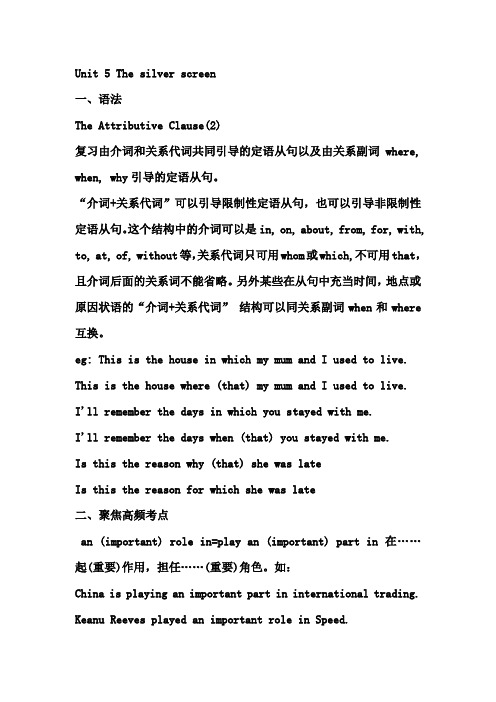
Unit 5 The silver screen一、语法The Attributive Clause(2)复习由介词和关系代词共同引导的定语从句以及由关系副词where, when, why引导的定语从句。
“介词+关系代词”可以引导限制性定语从句,也可以引导非限制性定语从句。
这个结构中的介词可以是in, on, about, from, for, with, to, at, of, without等,关系代词只可用whom或which,不可用that,且介词后面的关系词不能省略。
另外某些在从句中充当时间,地点或原因状语的“介词+关系代词”结构可以同关系副词when和where 互换。
eg: This is the house in which my mum and I used to live. This is the house where (that) my mum and I used to live.I'll remember the days in which you stayed with me.I'll remember the days when (that) you stayed with me.Is this the reason why (that) she was lateIs this the reason for which she was late二、聚焦高频考点an (important) role in=play an (important) part in 在……起(重要)作用,担任……(重要)角色。
如:China is playing an important part in international trading. Keanu Reeves played an important role in Speed.表示“负债”,如:Don't forget you still owe me 5000 RMB!owe ... to“感激;把……归功于……”The director owed his success to his family.买得起eg: He can afford an apartment.他能买得起一套住房。
人教版备战2012年英语教材高一重难点梳理Unit8 Sports教案
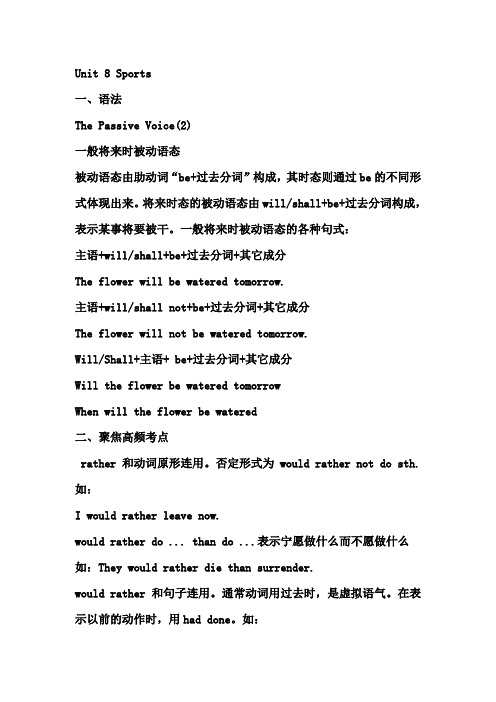
Unit 8 Sports一、语法The Passive Voice(2)一般将来时被动语态被动语态由助动词“be+过去分词”构成,其时态则通过be的不同形式体现出来。
将来时态的被动语态由will/shall+be+过去分词构成,表示某事将要被干。
一般将来时被动语态的各种句式:主语+will/shall+be+过去分词+其它成分The flower will be watered tomorrow.主语+will/shall not+be+过去分词+其它成分The flower will not be watered tomorrow.Will/Shall+主语+ be+过去分词+其它成分Will the flower be watered tomorrowWhen will the flower be watered二、聚焦高频考点rather和动词原形连用。
否定形式为would rather not do sth.如:I would rather leave now.would rather do ... than do ...表示宁愿做什么而不愿做什么如:They would rather die than surrender.would rather和句子连用。
通常动词用过去时,是虚拟语气。
在表示以前的动作时,用had done。
如:I'd rather you went home now.I'd rather he hadn't done that.in多指参加小规模的活动如“球赛,游戏”等。
如:Come on, join in the ball game.He's going to join in the talk tonight.take part in 指参加会议或群众性活动等,着重说明句子主语参加该项活动并在活动中发挥作用。
如:We'll take part in social practice during the summer vacation. They often take part in outdoor activities.Part前有形容词修饰时,要用不定冠词。
人教版备战2012年英语教材高一重难点梳理Unit15 The necklace教案
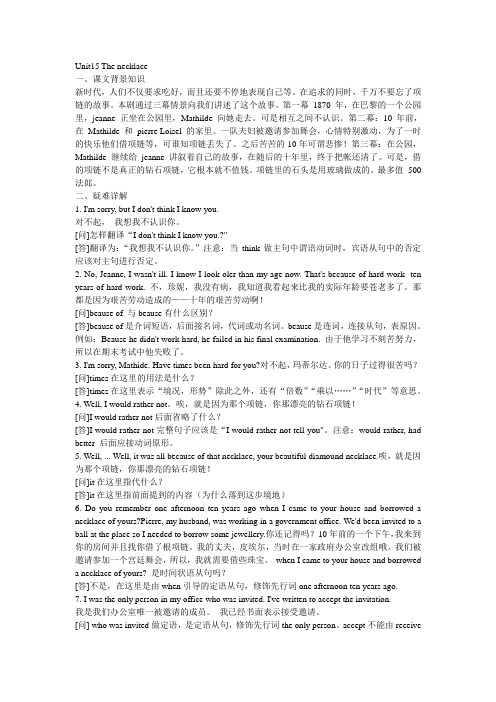
Unit15 The necklace一、课文背景知识新时代,人们不仅要求吃好,而且还要不停地表现自己等。
在追求的同时,千万不要忘了项链的故事。
本剧通过三幕情景向我们讲述了这个故事。
第一幕1870 年,在巴黎的一个公园里,jeanne 正坐在公园里,Mathilde 向她走去。
可是相互之间不认识。
第二幕:10 年前,在Mathilde 和pierre Loisel 的家里。
一队夫妇被邀请参加舞会,心情特别激动,为了一时的快乐他们借项链等,可谁知项链丢失了。
之后苦苦的10年可谓悲惨!第三幕:在公园,Mathilde 继续给jeanne 讲叙着自己的故事,在随后的十年里,终于把帐还清了。
可是,借的项链不是真正的钻石项链,它根本就不值钱。
项链里的石头是用玻璃做成的。
最多值500 法郎。
二、疑难详解1. I'm sorry, but I don't think I know you.对不起,我想我不认识你。
[问]怎样翻译“I don't think I know you.?"[答]翻译为:“我想我不认识你。
”注意:当think做主句中谓语动词时,宾语从句中的否定应该对主句进行否定。
2. No, Jeanne, I wasn't ill. I know I look oler than my age now. That's because of hard work -ten years of hard work. 不,珍妮,我没有病,我知道我看起来比我的实际年龄要苍老多了。
那都是因为艰苦劳动造成的——十年的艰苦劳动啊![问]beause of 与beause有什么区别?[答]beause of是介词短语,后面接名词,代词或动名词。
beause是连词,连接从句,表原因。
例如:Beause he didn't work hard, he failed in his final examination. 由于他学习不刻苦努力,所以在期末考试中他失败了。
人教版备战2012年英语教材高一重难点梳理unit17famouswomen教案
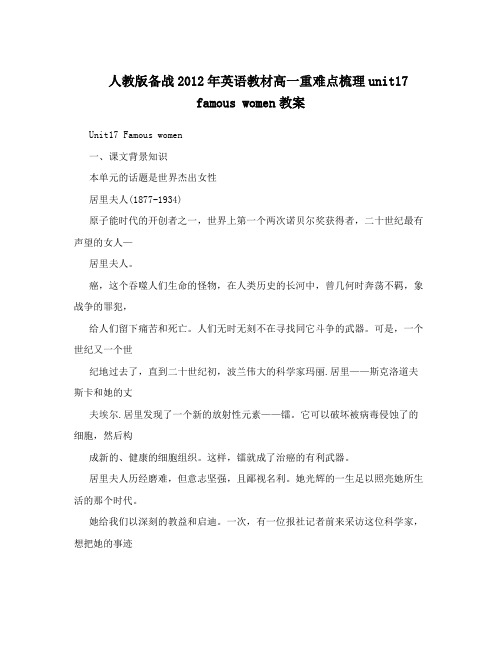
人教版备战2012年英语教材高一重难点梳理unit17famous women教案Unit17 Famous women一、课文背景知识本单元的话题是世界杰出女性居里夫人(1877-1934)原子能时代的开创者之一,世界上第一个两次诺贝尔奖获得者,二十世纪最有声望的女人—居里夫人。
癌,这个吞噬人们生命的怪物,在人类历史的长河中,曾几何时奔荡不羁,象战争的罪犯,给人们留下痛苦和死亡。
人们无时无刻不在寻找同它斗争的武器。
可是,一个世纪又一个世纪地过去了,直到二十世纪初,波兰伟大的科学家玛丽.居里——斯克洛道夫斯卡和她的丈夫埃尔.居里发现了一个新的放射性元素——镭。
它可以破坏被病毒侵蚀了的细胞,然后构成新的、健康的细胞组织。
这样,镭就成了治癌的有利武器。
居里夫人历经磨难,但意志坚强,且鄙视名利。
她光辉的一生足以照亮她所生活的那个时代。
她给我们以深刻的教益和启迪。
一次,有一位报社记者前来采访这位科学家,想把她的事迹报道出去。
她坚定地回答:“在科学上重要的是研究出来的‘东西’,不是研究者的‘个人’。
她还说,”人必须有耐心,特别是要有信心”,我们应该相信,自己对于某种事业有特殊的才干,并且应该不惜任何代价来完成这个事业。
”有名的学者爱因斯坦曾经这样评价居里夫人:“在我所认识的所有著名人物里面,居里夫人是唯一不为盛名所颠倒的人。
”Mother Teresa(1990-1997)一位天使英雄(angel hero),一生为普通民众行善的修女,有一段评价为证——“onSeptember5, 1997, late in the evening around 9:30 p.m., Mother Teresa goes to Heaven in the Mother house in Calcutta. Totally finished and worn out, as she had given herself totally, wholeheartedly, freely and unconditionally to the poorest of the poor, for the love of jesus."”Helen Thayer著名的探险家和作家(Adventurer and author),第一位独立到北极,和撒哈拉沙漠的女性(firstsolo woman to make the North Pole trekking, the first woman to walk across the Sahara Desert)。
人教版备战2012年英语教材高一重难点梳理Unit12 Art and literature教案
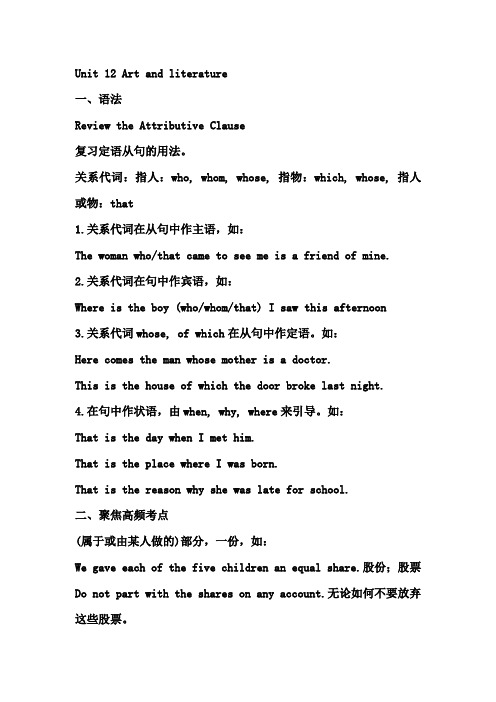
Unit 12 Art and literature一、语法Review the Attributive Clause复习定语从句的用法。
关系代词:指人:who, whom, whose, 指物:which, whose, 指人或物:that1.关系代词在从句中作主语,如:The woman who/that came to see me is a friend of mine.2.关系代词在句中作宾语,如:Where is the boy (who/whom/that) I saw this afternoon3.关系代词whose, of which在从句中作定语。
如:Here comes the man whose mother is a doctor.This is the house of which the door broke last night.4.在句中作状语,由when, why, where来引导。
如:That is the day when I met him.That is the place where I was born.That is the reason why she was late for school.二、聚焦高频考点(属于或由某人做的)部分,一份,如:We gave each of the five children an equal share.股份;股票Do not part with the shares on any account.无论如何不要放弃这些股票。
(常与in连用)共用;分摊;共有We shared the sweets. 我们分吃了糖果。
They share their joys and sorrows. 他们同甘共苦。
across“(偶然)遇见或发现”I came across an old friend of yours the other day.I came across the new book here.like听起来像;feel like感到像;smell like闻起来像That sounds like a good idea.What does the perfume smell likeThe material feels like silk.about to ... when “正要做……突然”;如:We were about to leave when it started to rain.Can you turn it into Japanese三、常用词语和句型戏法;把戏;花样。
人教版备战2012年英语教材高一重难点梳理Unit1 Good Friend教案

U n i t1G o o d F r i e n d s一、语法DirectandIndirectSpeech(1)直接引语和间接引语1.直接引语在改为间接引语时,时态需要做相应的调整。
eg:"IbrokeyourCDplayer."(一般过去时改成过去完成时) HetoldmehehadbrokenmyCDplayer.Jennysaid,"Ihavelostabook."(现在完成时改成过去完成时)Jennysaidshehadlostabook.Mumsaid,"I’llgotoseeafriend."(一般将来时改成过去将来时) Mumsaidshewouldgotoseeafriend.Hesaid,"Wehadn'tfinishedourhomework."(过去完成时保留原有的时态)Hesaidtheyhadn'tfinishedtheirhomework.注意:直接引语是客观真理,过去进行时,时态不变。
2.在直接引语变间接引语时,如果从句中的主语时第一人称或被第一人称所修饰,从句中的人称要按照主句中主语的人称变化。
如:Marysaid,"Mybrotherisanengineer."Marysaidherbrotherwasandengineer.3.直接引语如果是反意疑问句,选择疑问句或一般疑问句,间接引语应改为由whether或if引导的宾语从句。
如:Hesaid,"Canyourun,Mike"HeaskedMikewhether/ifhecouldrun.4.直接引语如果是祈使句,间接引语应改为“tell(ask,order,beg等)sb(not)todosth”句型。
如:"Passmethewater,please."saidhe.Heaskedhimtopassherthewater.5.直接引语如果是以“Let's”开头的祈使句,变为间接引语时,通常用“suggest+动名词或从句”的结构。
人教版备战2012年英语教材高一重难点梳理Unit6 Good manner教案
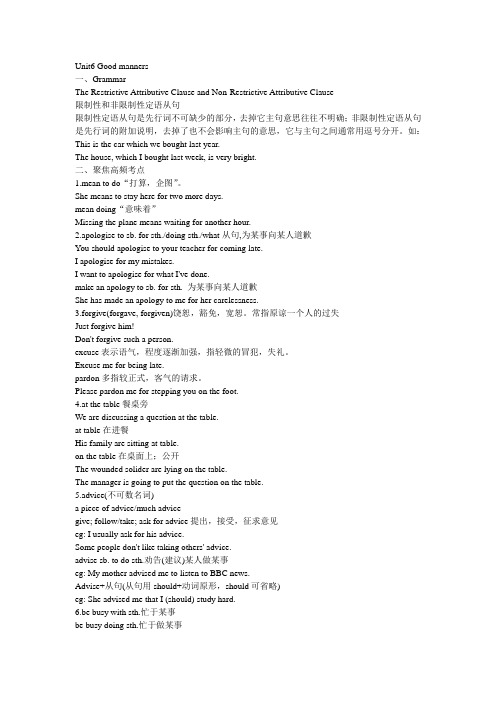
Unit6 Good manners一、GrammarThe Restrictive Attributive Clause and Non-Restrictive Attributive Clause限制性和非限制性定语从句限制性定语从句是先行词不可缺少的部分,去掉它主句意思往往不明确;非限制性定语从句是先行词的附加说明,去掉了也不会影响主句的意思,它与主句之间通常用逗号分开。
如:This is the car which we bought last year.The house, which I bought last week, is very bright.二、聚焦高频考点1.mean to do“打算,企图”。
She means to stay here for two more days.mean doing“意味着”Missing the plane means waiting for another hour.2.apologise to sb. for sth./doing sth./what从句,为某事向某人道歉You should apologise to your teacher for coming late.I apologise for my mistakes.I want to apologise for what I've done.make an apology to sb. for sth. 为某事向某人道歉She has made an apology to me for her carelessness.3.forgive(forgave, forgiven)饶恕,豁免,宽恕。
常指原谅一个人的过失Just forgive him!Don't forgive such a person.excuse表示语气,程度逐渐加强,指轻微的冒犯,失礼。
人教版备战2012年英语教材高一重难点梳理Unit21 Body Language教案

Unit 21 Body Language一.课文背景知识语言的沟通,并非全靠“言语”在进行。
能够以“非言语”即所谓的Body Language和其他为手段来表达各种信息,这已是众人熟知的事情。
根据某项研究显示,70%的沟通可说是以“非言语”为媒介来传达。
因此,脸部表情(facial expressions)、手势(gesture)、姿态(posture)等等,无不隐含着重要的意义。
这些Body Language与言语、文化具有无法割舍的关系。
或许是难得其间三味吧?很多英语学习者往往由于作法不当以致于人“东施效颦”的不良印象,所以不可不慎。
对于演说中Body Language的“东施效颦”究竟意指什么呢?心存疑惑的人想来也是不在少数吧。
此举且举其一为例。
在用英语说: "I don't know"的时候,有人便做出稍为摊开双手并且耸耸肩膀的Body Language。
不过这项Body Language系属相当西洋式的姿势,如果由东方人来做的话,经常带给对方颇不对劲的感觉。
这就有如清末初洋服刚刚传入中国不久时,当穿起洋服招摇过市的话总要惹人侧目的情形一般。
基本上,对于与自己不搭调的Body Language还是少用为宜。
如果刻意摆首弄姿,往往引起反效果。
重要的是,不要勉强。
倘若扭捏地模仿“洋人的姿态”,不仅徒然予人卑屈的印象,而且容易招致所谓的“中国人也和洋人作同样的Body Language吗?”的奇妙误解。
说话之际最好根据自己本身的经验,采取自然形成的“Body Language”为宜。
不过有一点要特别注意,即有关“视线”方面,大部分的中国人都有看着“天空”说话的毛病,容易给予人不诚恳的印象,所以要留心尽量目视观众才好。
二、疑难详解1. We can learn a lot about what a perso nis thinking by watching his or her body language. 我们能够通过一个人的身体的动作了解他的许多所四所想。
人教版备战2012年英语教材高一重难点梳理Unit10 The world around us教案
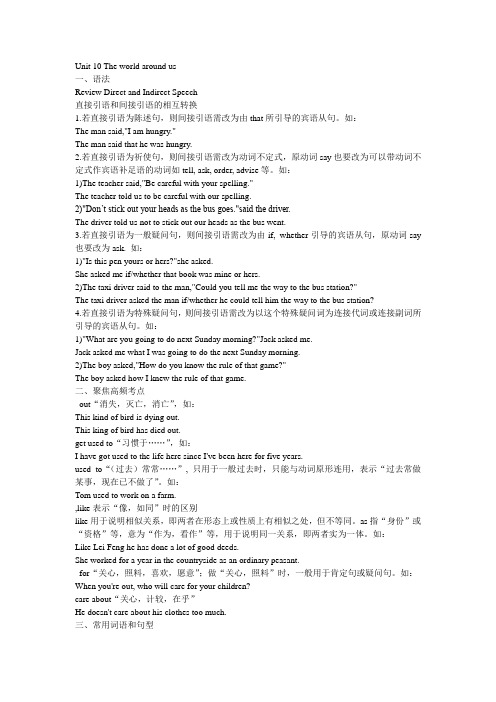
Unit 10 The world around us一、语法Review Direct and Indirect Speech直接引语和间接引语的相互转换1.若直接引语为陈述句,则间接引语需改为由that所引导的宾语从句。
如:The man said,"I am hungry."The man said that he was hungry.2.若直接引语为祈使句,则间接引语需改为动词不定式,原动词say也要改为可以带动词不定式作宾语补足语的动词如tell, ask, order, advise等。
如:1)The teacher said,"Be careful with your spelling."The teacher told us to be careful with our spelling.2)"Don’t stick out your heads as the bus goes."said the driver.The driver told us not to stick out our heads as the bus went.3.若直接引语为一般疑问句,则间接引语需改为由if, whether引导的宾语从句,原动词say 也要改为ask. 如:1)"Is this pen yours or hers?"she asked.She asked me if/whether that book was mine or hers.2)The taxi driver said to the man,"Could you tell me the way to the bus station?"The taxi driver asked the man if/whether he could tell him the way to the bus station?4.若直接引语为特殊疑问句,则间接引语需改为以这个特殊疑问词为连接代词或连接副词所引导的宾语从句。
人教版备战2012年英语教材高一重难点梳理Unit4 Unforgettable experiences教案
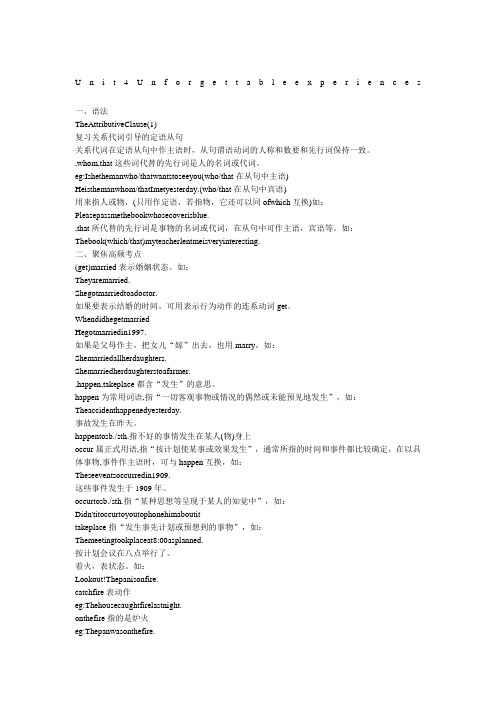
U n i t4U n f o r g e t t a b l e e x p e r i e n c e s一、语法TheAttributiveClause(1)复习关系代词引导的定语从句关系代词在定语从句中作主语时,从句谓语动词的人称和数要和先行词保持一致。
,whom,that这些词代替的先行词是人的名词或代词。
eg:Ishethemanwho/thatwantstoseeyou(who/that在从句中主语)Heisthemanwhom/thatImetyesterday.(who/that在从句中宾语)用来指人或物,(只用作定语,若指物,它还可以同ofwhich互换)如:Pleasepassmethebookwhosecoverisblue.,that所代替的先行词是事物的名词或代词,在从句中可作主语,宾语等。
如:Thebook(which/that)myteacherlentmeisveryinteresting.二、聚焦高频考点(get)married表示婚姻状态。
如:Theyaremarried.Shegotmarriedtoadoctor.如果要表示结婚的时间,可用表示行为动作的连系动词get。
WhendidhegetmarriedHegotmarriedin1997.如果是父母作主,把女儿“嫁”出去,也用marry,如:Shemarriedallherdaughters.Shemarriedherdaughterstoafarmer.,happen,takeplace都含“发生”的意思。
happen为常用词语,指“一切客观事物或情况的偶然或未能预见地发生”,如:Theaccidenthappenedyesterday.事故发生在昨天。
happentosb./sth.指不好的事情发生在某人(物)身上occur属正式用语,指“按计划使某事或效果发生”,通常所指的时间和事件都比较确定,在以具体事物,事件作主语时,可与happen互换,如:Theseeventsoccurredin1909.这些事件发生于1909年。
人教版备战2012年英语教材高一重难点梳理Unit16 Scientists at work教案
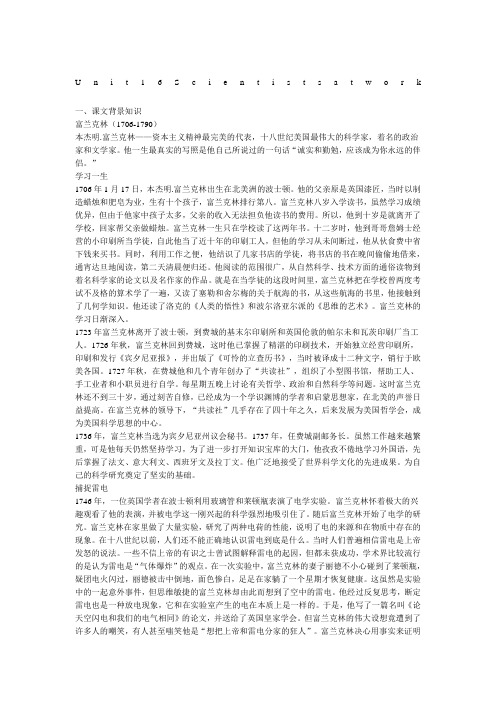
U n i t16S c i e n t i s t s a t w o r k一、课文背景知识富兰克林(1706-1790)本杰明.富兰克林——资本主义精神最完美的代表,十八世纪美国最伟大的科学家,着名的政治家和文学家。
他一生最真实的写照是他自己所说过的一句话“诚实和勤勉,应该成为你永远的伴侣。
”学习一生1706年1月17日,本杰明.富兰克林出生在北美洲的波士顿。
他的父亲原是英国漆匠,当时以制造蜡烛和肥皂为业,生有十个孩子,富兰克林排行第八。
富兰克林八岁入学读书,虽然学习成绩优异,但由于他家中孩子太多,父亲的收入无法担负他读书的费用。
所以,他到十岁是就离开了学校,回家帮父亲做蜡烛。
富兰克林一生只在学校读了这两年书。
十二岁时,他到哥哥詹姆士经营的小印刷所当学徒,自此他当了近十年的印刷工人,但他的学习从未间断过,他从伙食费中省下钱来买书。
同时,利用工作之便,他结识了几家书店的学徒,将书店的书在晚间偷偷地借来,通宵达旦地阅读,第二天清晨便归还。
他阅读的范围很广,从自然科学、技术方面的通俗读物到着名科学家的论文以及名作家的作品。
就是在当学徒的这段时间里,富兰克林把在学校曾两度考试不及格的算术学了一遍,又读了塞勒和舍尔梅的关于航海的书,从这些航海的书里,他接触到了几何学知识。
他还读了洛克的《人类的悟性》和波尔洛亚尔派的《思维的艺术》。
富兰克林的学习日渐深入。
1723年富兰克林离开了波士顿,到费城的基末尔印刷所和英国伦敦的帕尔未和瓦茨印刷厂当工人。
1726年秋,富兰克林回到费城,这时他已掌握了精湛的印刷技术,开始独立经营印刷所,印刷和发行《宾夕尼亚报》,并出版了《可怜的立查历书》,当时被译成十二种文字,销行于欧美各国。
1727年秋,在费城他和几个青年创办了“共读社”,组织了小型图书馆,帮助工人、手工业者和小职员进行自学。
每星期五晚上讨论有关哲学、政治和自然科学等问题。
这时富兰克林还不到三十岁,通过刻苦自修,已经成为一个学识渊博的学者和启蒙思想家,在北美的声誉日益提高。
人教版备战2012年英语教材高一重难点梳理Unit2 English around the world教案
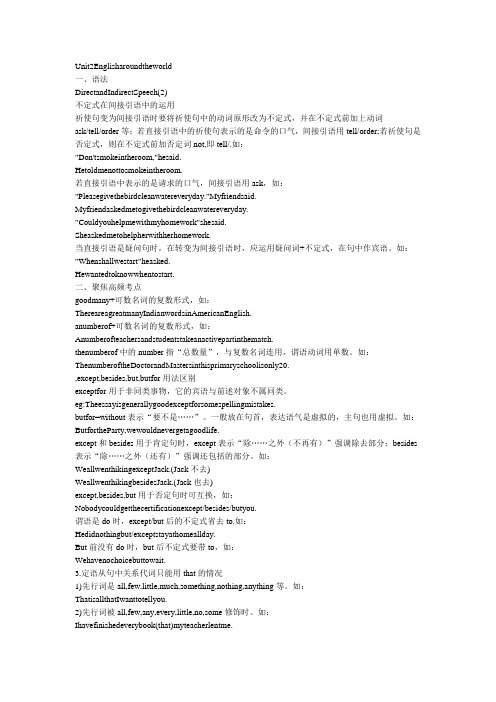
Unit2Englisharoundtheworld一、语法DirectandIndirectSpeech(2)不定式在间接引语中的运用祈使句变为间接引语时要将祈使句中的动词原形改为不定式,并在不定式前加上动词ask/tell/order等;若直接引语中的祈使句表示的是命令的口气,间接引语用tell/order;若祈使句是否定式,则在不定式前加否定词not,即tell/.如:"Don'tsmokeintheroom,"hesaid.Hetoldmenottosmokeintheroom.若直接引语中表示的是请求的口气,间接引语用ask,如:"Pleasegivethebirdcleanwatereveryday."Myfriendsaid. Myfriendaskedmetogivethebirdcleanwatereveryday. "Couldyouhelpmewithmyhomework"shesaid.Sheaskedmetohelpherwithherhomework.当直接引语是疑问句时,在转变为间接引语时,应运用疑问词+不定式,在句中作宾语。
如:"Whenshallwestart"heasked.Hewantedtoknowwhentostart.二、聚焦高频考点goodmany+可数名词的复数形式,如:ThereareagreatmanyIndianwordsinAmericanEnglish.anumberof+可数名词的复数形式,如:Anumberofteachersandstudentstakeanactivepartinthematch.thenumberof中的number指“总数量”,与复数名词连用,谓语动词用单数。
如:ThenumberoftheDoctorandMastersinthisprimaryschoolisonly20.,except,besides,but,butfor用法区别exceptfor用于非同类事物,它的宾语与前述对象不属同类。
人教版备战2012年英语教材高一重难点梳理Unit3 Going places教案
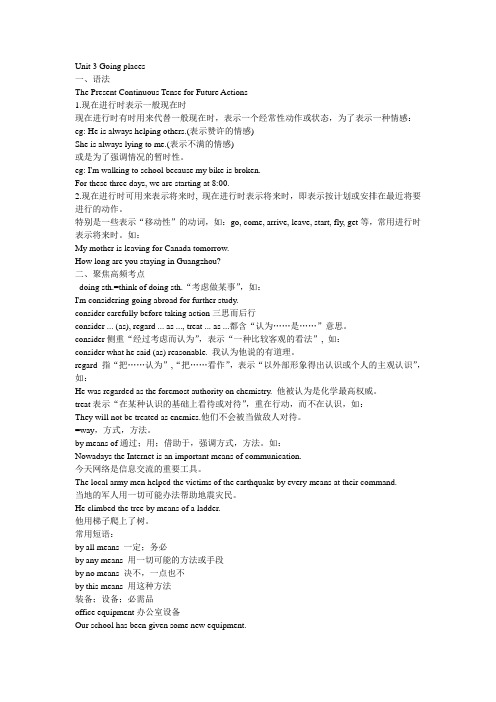
Unit 3 Going places一、语法The Present Continuous Tense for Future Actions1.现在进行时表示一般现在时现在进行时有时用来代替一般现在时,表示一个经常性动作或状态,为了表示一种情感:eg: He is always helping others.(表示赞许的情感)She is always lying to me.(表示不满的情感)或是为了强调情况的暂时性。
eg: I'm walking to school because my bike is broken.For these three days, we are starting at 8:00.2.现在进行时可用来表示将来时, 现在进行时表示将来时,即表示按计划或安排在最近将要进行的动作。
特别是一些表示“移动性”的动词,如:go, come, arrive, leave, start, fly, get等,常用进行时表示将来时。
如:My mother is leaving for Canada tomorrow.How long are you staying in Guangzhou?二、聚焦高频考点doing sth.=think of doing sth.“考虑做某事”,如:I'm considering going abroad for further study.consider carefully before taking action三思而后行consider ... (as), regard ... as ..., treat ... as ...都含“认为……是……”意思。
consider侧重“经过考虑而认为”,表示“一种比较客观的看法”, 如:consider what he said (as) reasonable. 我认为他说的有道理。
- 1、下载文档前请自行甄别文档内容的完整性,平台不提供额外的编辑、内容补充、找答案等附加服务。
- 2、"仅部分预览"的文档,不可在线预览部分如存在完整性等问题,可反馈申请退款(可完整预览的文档不适用该条件!)。
- 3、如文档侵犯您的权益,请联系客服反馈,我们会尽快为您处理(人工客服工作时间:9:00-18:30)。
本单元高考热点归纳与拓展[概述]本单元重点语法是had better,should 和ought to 等情态动词的用法。
象其他的情态动词一样,had better,should 和ought to 后面跟动词原形。
ought to 与should 都表示“应该”的意思。
had better 表示“最好”的意思。
如:You had better get some rest.你最好休息一会儿。
You had better not eat fruit that isn't ripe. 你最好不要吃没有成熟的水果。
You should/ought to be careful with fruit. 你们应该小心水果。
You should not/ought to eat so much junk food. 你不应该吃这么多垃圾食品。
[经典解析]例:1.I didn't hear the phone. I_____asleep. (1989年全国高考题)A. must beB.must have beenC.should beD.should have been简析:答案B。
从didn't 可知是过去的事情。
“当时我一定睡着了”。
表示对过去的事情进行肯定推测要用must+have+动词的过去分词。
而shuold have been asleep 则表示过去该睡着而没有睡着,与前面的意思不相符。
例:2.He ______ you more help, even though he was very busy. (1990年全国高考题) A: might have given B: might give C: may have given D: may give简析:答案A。
从was可知是对过去的事情表示推测,应该用情态动词+have+动词的过去分词,排除B、D。
根据“当时他非常忙”的事实,他可能给你更大的帮助的可能性很小,所以选might 比选may 好。
例:3.—Could I borrow your dictionary?—Yes,of course you_____. (1992年全国高考题)A.mightB.willC.canD.should简析:答案C。
文句中用could 是委婉地提出要求,答句中从of course 可知道,应该非常肯定地同意,所以用can。
例:4.It's nesrly seven o'clock. Jack _____be here at any moment. (1995年全国高考题)A.mustB.needC.shouldD.can简析:答案C。
must一定;need需要;should可能,该;can能。
例:5.—write to me when you get home. (2001年春季高考题)—_____.A.I mustB.I shouldC.I willD.I can简析:答案C。
前者发出请求。
后者表示应允“我会的”。
will用于第一人称,表示有意识的行动,表现为意愿,意志等。
透视情态动词的考试不仅如此,在阅读等方面,它会经常出现。
掌握情态动词的用法关系到我们能否正确理解文章大意的问题,直接影响着我们的做题。
四、本单元生词详解1. sweet [swi:t]adj. 填的,甜味的;芳香的,新鲜的;悦耳的,动听的;亲切的,温柔的,温和的;惬意的//n. 糖果;甜食;布丁;(餐后的)一道甜食例:The foowers sweet. 这些花闻起来香。
How sweet the music sounds! 这音乐多么美妙动听!What a sweet girl! 多么可爱的小姑娘!Chocolates and coffees are sweets. 巧克力和咖啡豆都是糖果。
[记忆技巧]联想记忆:表示味道的词sour酸的;bitter苦的;salty咸的;peppery甜胡椒味的2. French fries 炸薯条例:He likes to eat French fries. 他喜欢吃炸薯条。
[记忆技巧]对比记忆;美式英语French fries; 英式英语potato chips.3. mushroom [5mQFrum]n. ( 食用)蘑菇,洋菇;急速成长之物;突然发迹之人,暴发户//adj. 雨后春笋般的,急速成长的//vi. 采集蘑菇;急速生长(发展)例:fried[fraid]v. fry 的过去式和过去分词//adj. 油煎的,油炸的例:She has an fried egg for her breakfast. 她早餐吃了一个煎蛋。
[记忆技巧]同义词联想记忆:wastes 废物;junk 废物[常用词组]a junk heap 废物堆6. fat fAt adj. 肥大的,肥胖的//n. 脂肪;油脂,油例:He's fat because so much. 他身体胖,因为吃得太多了。
He is getting fat. 他在发胖。
I don't like fat meat. 我不喜欢吃肥肉。
They have a lot of fat under their skin. 他们的皮肤下面有很多脂肪。
Butter and margarine are fats. 黄油和人造黄油都是脂肪。
[记忆技巧]反义词对比记忆:fat肥大的,肥胖的;thin瘦的[常用词组]a fat job 好差事/a fat man 肥胖的人。
7. vitamin[5vaitEmin]n.维生素例:Oranges contain vitamin C: 橘子含有维生素C。
8. snack [snAk] n.小吃例如:I'm not hungry but I'd like a snack. 我并不饿,不过我倒喜欢来点小吃。
[记忆技巧]人身体各个部位归纳记忆:head 头;hand 手;waist 腰10. fever[5fi:vE]n. 发热,发烧//(通常指)狂热,激动例如:My fever is gone, but I still have a cough. 我的烧已经退了,但还有点儿咳嗽。
He has a fever and a temperiture of 38.5 degree.他发烧,体温38.5摄氏度。
I am in a fever of excitement. 我十分兴奋。
11. salad [5sAlEd]n.色拉(西餐中的凉拌菜)例如:He dislikes salad. 他不喜欢吃凉拌菜。
[记忆技巧]菜肴联想记忆:salad; fried chicken 油煎鸡肉12. peach[pi:tF]n. 桃子例如:Mother put the peaches in her basket. 母亲把桃子放在篮子里。
There is a peach tree near the house. 那所房子附近有课桃树。
[记忆技巧]水果类联想记忆:apple; banana'pear;peach 等13. ripe[raip]adj.熟的, 成熟的例:Autumn is a busy season, and the crops are ripe. 秋季是繁忙的季节,庄稼成熟了。
A green banana is not ripe enough to eat. 青香蕉没成熟,不能吃。
Soon ripe, soon rotten. 早熟则早老。
[常用词组]ripe lips 红润的嘴唇/ripe beauty 成年的美女14. ought[C:t]aux. 应该;应当;该会;理应例:As a Party member, you ought to give the lead. 作为党员,你应该带头。
This word ought to be done at nice. 这项工作应该马上就做。
We ought to be hearing from them soon, then. 这么说,我们大概不久就可以接到他们的信了。
They ought to be go now, oughtn't they?他们应该走了,对吗?Bruce is the fastest runner, so he ought to win the race. 布鲁斯跑得最快,所以他该会赢得这场赛跑的。
He said he ought ot write an article about it. 他说他该为这写一篇文章。
[记忆技巧]情态动词联想记忆:ought to 应该;should 应该;must 必须;may可以;can能够,could,might等15. examine[i^5zAmin]vt. 检查;细看;对...进行考试;询问;查问;对...进行审查例:All the machines will be examined. 所有机器都将被检查一遍。
I examined the door and found that it was locked. 我检查这个门,发现它上了琐。
He examined the boys in English. 他考孩子们的英语。
The teacher will examine the class on everything they have learnt this year. 教师要考学生今年学过的所有知识。
He was examined by the police. 他被警察查问。
16. soft [sCft]adj. 软的,硬度低的;柔嫩的,光滑;(颜色)淡的,柔和的;模糊的,听不清;软弱的,温和的;不含酒精的例:My shirt has a soft collar. 我的衬衣领子是软的。
Wood is softer than stone. 木头比石头软。
This cloth is made of soft silk. 这布料是用光滑的针织成的。
I was satisfied with the soft colour of the room. 我对房间的柔和颜色很满意。
We felt the first soft wind of spring. 我们感到了春天的第一阵和风。
She speaks in a soft voice. 她说话的声音很柔和。
Lemonade is a soft drink. 柠檬水是一种不含酒精的饮料。
[记忆技巧]联想记忆:近义词gentle; 反义词hard硬的。
17. bar[bB:]n. (固定在门窗上的木质或金属)棒;(门、窗的)格子;(门的)横木;栅栏;(练习芭蕾舞用的)横杠;棒状之物(结块)例:The windows of the prison have iron bars. 监狱的窗户装有铁栅栏。
